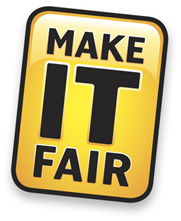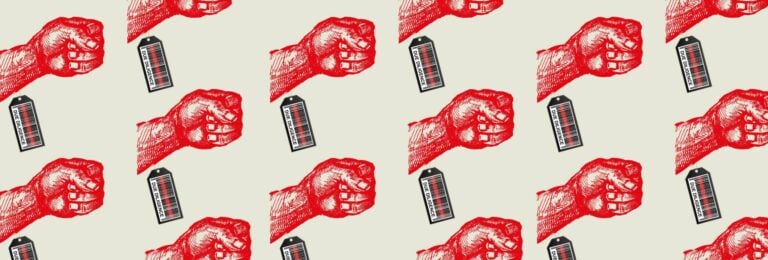
Results of the makeITfair project
makeITfair was a European project focusing on the electronics industry, especially on consumer electronics such as mobile phones and laptops. The aim of the project was to inform young people across Europe about labour abuse and environmental problems in the electronics industry and activate them to improve the situation.
After the first term of the project (2007-2009), the EU decided to finance makeITfair for another period of 3 years (2010-2012). After that, the makeITfair project continued with partners from all over Europe, but at a slower pace. On 8 December 2014, the project officially came to an end.
However, we will continue our efforts to make the IT industry more sustainable, prevent human rights violations and improve working conditions.
Would you like to stay informed about the electronics industry?
Please go to the GoodElectronics website(opens in new window) , subscribe to the GoodElectronics newsletter(opens in new window) or follow the work of our partners:
- SwedWatch(opens in new window) and Fair Trade Center(opens in new window) , Sweden
- Finnwatch(opens in new window) and Repu-Pro Fair Trade, Finland
- Germanwatch(opens in new window) , Germany
- Finnish Association for Nature Reservation(opens in new window) , Finland
- Pro Ethical Trade Finland(opens in new window) , Finland
- DanWatch(opens in new window) , Denmark
- Association of Conscious Consumers (ACC),(opens in new window) Hungary
- ACIDH(opens in new window) , DR Congo
- CIVIDEP(opens in new window) , India
- Workers Assistence Center (WAC),(opens in new window) Philippines
- Civil Society Research and Support Collective(opens in new window) (CSRSC), South Africa
Project funding
This project has been produced with the assistance of the European Union. The contents of this project is the sole responsibility of SOMO and can in no way be taken to reflect the views of the European Union.
Results of makeITfair
makeITfair has been a very succesful project. The following table gives an idea of what the makeITfair project has achieved, especially from 2010 to 2012:
| Aims for 2010-2012 | Actual result |
| 5 million consumers will be made aware of the issues | 70,5 million consumers are aware |
| 1,000 teachers will be made aware | 10,592 teachers are aware |
| 30 multiplying organisations will be made aware | 901 representatives of multiplying organisations are aware |
| 50 company representatives are reached with information | 527 company representatives are reached |
| 10,000 consumers will express their support | 15,599 consumers have expressed their support |
| 10 multipliers will undertake activities and mobilise consumers | 45 multipliers undertook activities to mobilies consumers |
| 10 companies will improve social and environmental policies and [..] conditions | 28 companies have improved social and environmental policies and conditions |
Reach
Through makeITfairs campaigns, events and publications, in total over seventy million people have been exposed to the problems in the supply chain of electronics, which is 1,400% times the set goal for makeITfair. It is difficult to assess how many young consumers were reached, but most probably more than 2.5 million. On social media, makeITfair did quite well and the numbers kept increasing over the years: eventually almost 2,500 young people joined the Facebook group, the Facebook page got 550 likes and there were 902 followers on Twitter.
Actions
Through research, dialogue meetings, websites and the mailing list of GoodElectronics, company representatives from the electronics industry were made aware of issues, raising the chances for a change in behaviour. Over 10,000 consumers were mobilised after two makeITfair campaigns: one towards network operators and one towards Apple. More than 10 multipliers mobilized the makeITfair actions. A workshop and a brochure about action methods that these multipliers could take was initiated, but mobilizing change was difficult and makeITfair thereafter focused on media work, education work and dialogue with companies. Also, some companies were involved and took steps to improve policies and conditions.
Events
Especiallly in 2012, a number of workshops, lectures and debates were organised by makeITfair. For example:
- Lecture, Studium Generale – 21 November 2012, Leiden Universiteit, ‘MakeITfair: Duurzaamheid, de productieketen van elektronica”
- ETI Norway seminar “Good electronic choices”, 15 May 2012, ‘MakeITfair presentation’
- Jongerendebat, Universiteit Wageningen, 1 October 2012, ‘Inleiding “Conflict grondstoffen uit Congo”
- 2012 International Supply Management Congress, Workshop “The Conflict Free Tin-initiative: how is business preparing for a sustainable future?” November 29 & 30, 2012, Amsterdam
- VBDO & KPMG Verantwoord Ketenbeheer Bijeenkomst met Award Uitreiking, 27 November, 2012, Panel debate with experts.
Round table
One of the highlights of the makeITfair project was the Round Table gathering held on 7 and 8 May 2009. The idea was to gather various electronics companies and civil society organisations to discuss current labour issues in the global electronics industry and to find common ground. At first, the invited companies were hesitant to join. Eventually, 25 representatives came to the Round Table. It turned out to be a unique gathering, where important topics were discussed in a very open manner.
Action Day
Another highlight was the Action Day held on 7 May 2011. The goal was to show Apple and the entire IT sector that consumers do not accept unfair working conditions and environmental destruction. Many youngsters joined the makeITfair team to demand that the big brand electronics companies take responsibility for their supply chain and products.
Webquest
The makeITfair webquest has been developed for students between 13 and 17 years old and was available in Swedish, Finnish, English, Hungarian, German and Dutch. Many students and teachers have been working with the educational material and finished the interactive, visual and informative lessons with a web quiz.
Publications
makeITfair has issued more than 40 publications, in various languages. The report on e-waste has been the most downloaded report. All publications are still available the GoodElectronics (opens in new window) and SOMO website.
Do you need more information?
-

Alejandro González
Senior Researcher
Related content
-
 The hidden human costs linked to global supply chains in ChinaPosted in category:News
The hidden human costs linked to global supply chains in ChinaPosted in category:News Joshua RosenzweigPublished on:
Joshua RosenzweigPublished on: -
 Major brands sourcing from China lack public policies on responsible exitPosted in category:News
Major brands sourcing from China lack public policies on responsible exitPosted in category:News Joshua RosenzweigPublished on:
Joshua RosenzweigPublished on: -


